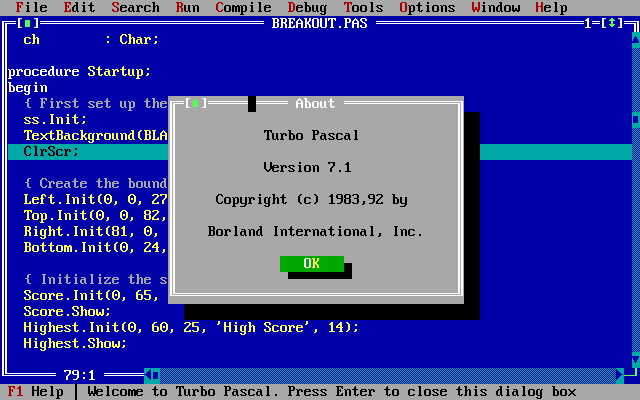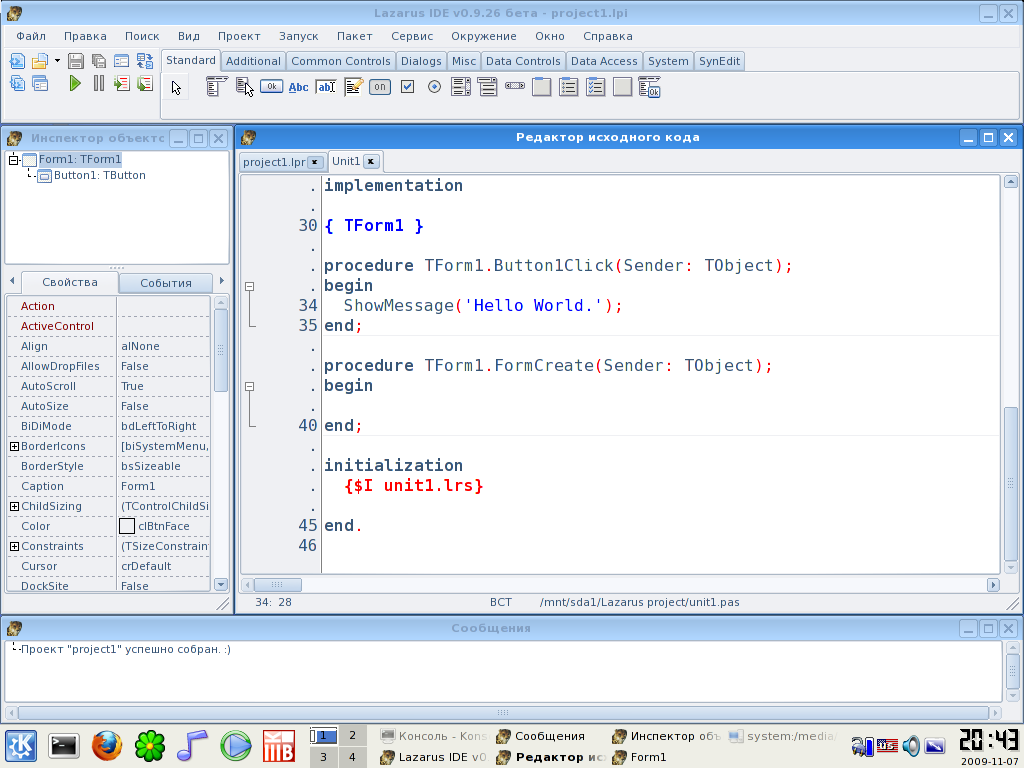Ballad of Turbo Pascal or 20 years without change
Ballad of Turbo Pascal or 20 years without change
The first week of the new school year passed quietly and unnoticed. Even though I finished school a long time ago, but I don’t have my children of school age, I still think about the beginning of the school year. And this is not due to the domination of children in school uniforms on the streets: I very rarely leave the house.
The reason I remember that autumn has begun is rather unusual - I notice a fresh topic on the forum of my local network, wandering from year to year, sometimes appearing in the most unexpected sections of this forum. If you formulate this topic, you get only 4 words, reflecting the hopelessness of the situation with computer education in the former USSR, it sounds like this: “Where can I get Turbo Pascal?”
What I decided to finally write about this phenomenon is far from accident - I don’t know the exact date and month, but it was in 2012 that Turbo Pascal 7, which is widely used in all educational institutions in the post-Soviet space, turned 20 years old. It was in 1992 that version 7.0 was released, which for two decades ahead determined the beginning of the path for thousands of future programmers, and the screenshot below was imprinted in the memory of probably millions of people.
')

After another 2 years, version 7.1 was released, containing some corrections, but the development of the development environment stopped there. For 18 years now, one sixth of sushi has been roaming a file archive that fits on a couple of floppy disks - this is the very ill-fated TP7.zip (with slight variations in the file name). I don’t know another software product with the same portability - surely even the developers themselves didn’t imagine that their child would work on something older than Windows 95. Even Java, which appeared several years later and practicing the principle “compiled once it works everywhere”, doesn’t look like so original against the background of this modest IDE.
At the beginning, Turbo Pascal worked smartly under Dos, Win 3.11 and Win95, quietly switched to Windows 98 and Me. Then the first problems appeared with the launch under Windows XP, but TP was already unstoppable - it became an educational mainstream, it worked under everything, under Windows Vista, Windows 7. I would not be surprised if next year thousands of people will run bp.exe under Windows 8. Or maybe under Linux, using DosBox (happily discovering that the Ctrl-F9 combination closes the emulator).
Just 15 years ago, Turbo Pascal was a good learning environment, but now it’s rather an indication of how strongly a reluctance to learn something new can be. And it's not even in pascal: there are modern environments for teaching programming in this language, like FreePascal and PascalABC. It's not about politics: in Russia and Ukraine, the situation is almost the same. The matter is not even in the strictness of the school curriculum - I came across classes where instruction was conducted in C or Python. And, ultimately, it's not even in the classroom of an educational institution - until then, there are universities that are directly related to IT, where Turbo Pascal is used as the main working tool.
Concluding this brief review, I want to present alternatives for Turbo Pascal that can be used in the learning process.
1) FreePascal is a free Pascal compiler that meets modern requirements and has a 1 in 1 development environment similar to Turbo Pascal, which makes it possible to use most of the methodical literature written for the latter. Works under Windows and Linux.

Recommended as the easiest way to replace Turbo Pascal. There are no problems with the license.
Site of the Russian-speaking community http://www.freepascal.ru/
2) PascalABC - a convenient development environment working under Windows. Since 2007, a version of PascalABC.net has been developed - the same medium, but written using the .NET technology. For older computers, it is recommended to use the version without .NET. In my opinion, this is the most successful system for learning programming, which can be found.

The system was created at the Faculty of Mathematics, Mechanics and Computer Science at SFU as an educational programming environment. There are no problems with the license.
Developer site: http://sunschool.math.rsu.ru/pabc/
3) Lazarus is a development environment that uses the FreePascal compiler, but at the same time supports the development of modern window applications. It is positioned as compatible with Delphi, but the training material written for the latter is not always applicable. The interface is more complex than IDE FreePascal. It is recommended to use with sufficient qualifications of the teacher and understanding of what he wants to teach his students.

There are no problems with the license.
That's probably all. It remains only to wish recent applicants that the problem described here does not affect them.
The first week of the new school year passed quietly and unnoticed. Even though I finished school a long time ago, but I don’t have my children of school age, I still think about the beginning of the school year. And this is not due to the domination of children in school uniforms on the streets: I very rarely leave the house.
The reason I remember that autumn has begun is rather unusual - I notice a fresh topic on the forum of my local network, wandering from year to year, sometimes appearing in the most unexpected sections of this forum. If you formulate this topic, you get only 4 words, reflecting the hopelessness of the situation with computer education in the former USSR, it sounds like this: “Where can I get Turbo Pascal?”
What I decided to finally write about this phenomenon is far from accident - I don’t know the exact date and month, but it was in 2012 that Turbo Pascal 7, which is widely used in all educational institutions in the post-Soviet space, turned 20 years old. It was in 1992 that version 7.0 was released, which for two decades ahead determined the beginning of the path for thousands of future programmers, and the screenshot below was imprinted in the memory of probably millions of people.
')

After another 2 years, version 7.1 was released, containing some corrections, but the development of the development environment stopped there. For 18 years now, one sixth of sushi has been roaming a file archive that fits on a couple of floppy disks - this is the very ill-fated TP7.zip (with slight variations in the file name). I don’t know another software product with the same portability - surely even the developers themselves didn’t imagine that their child would work on something older than Windows 95. Even Java, which appeared several years later and practicing the principle “compiled once it works everywhere”, doesn’t look like so original against the background of this modest IDE.
At the beginning, Turbo Pascal worked smartly under Dos, Win 3.11 and Win95, quietly switched to Windows 98 and Me. Then the first problems appeared with the launch under Windows XP, but TP was already unstoppable - it became an educational mainstream, it worked under everything, under Windows Vista, Windows 7. I would not be surprised if next year thousands of people will run bp.exe under Windows 8. Or maybe under Linux, using DosBox (happily discovering that the Ctrl-F9 combination closes the emulator).
Just 15 years ago, Turbo Pascal was a good learning environment, but now it’s rather an indication of how strongly a reluctance to learn something new can be. And it's not even in pascal: there are modern environments for teaching programming in this language, like FreePascal and PascalABC. It's not about politics: in Russia and Ukraine, the situation is almost the same. The matter is not even in the strictness of the school curriculum - I came across classes where instruction was conducted in C or Python. And, ultimately, it's not even in the classroom of an educational institution - until then, there are universities that are directly related to IT, where Turbo Pascal is used as the main working tool.
Concluding this brief review, I want to present alternatives for Turbo Pascal that can be used in the learning process.
1) FreePascal is a free Pascal compiler that meets modern requirements and has a 1 in 1 development environment similar to Turbo Pascal, which makes it possible to use most of the methodical literature written for the latter. Works under Windows and Linux.

Recommended as the easiest way to replace Turbo Pascal. There are no problems with the license.
Site of the Russian-speaking community http://www.freepascal.ru/
2) PascalABC - a convenient development environment working under Windows. Since 2007, a version of PascalABC.net has been developed - the same medium, but written using the .NET technology. For older computers, it is recommended to use the version without .NET. In my opinion, this is the most successful system for learning programming, which can be found.

The system was created at the Faculty of Mathematics, Mechanics and Computer Science at SFU as an educational programming environment. There are no problems with the license.
Developer site: http://sunschool.math.rsu.ru/pabc/
3) Lazarus is a development environment that uses the FreePascal compiler, but at the same time supports the development of modern window applications. It is positioned as compatible with Delphi, but the training material written for the latter is not always applicable. The interface is more complex than IDE FreePascal. It is recommended to use with sufficient qualifications of the teacher and understanding of what he wants to teach his students.

There are no problems with the license.
That's probably all. It remains only to wish recent applicants that the problem described here does not affect them.
Source: https://habr.com/ru/post/151088/
All Articles